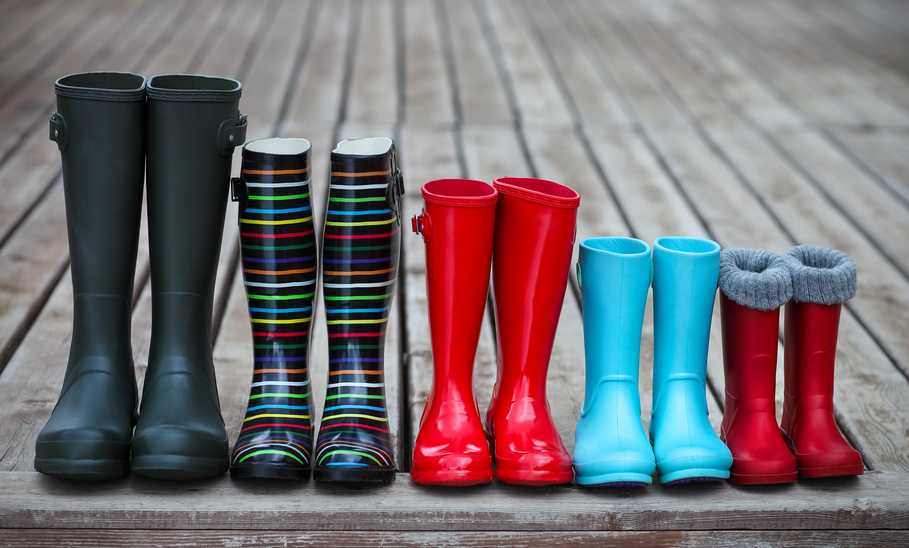Wet feet can easily ruin your day, not to mention your feet. Back in 1853, Hiram Hutchinson created one of the first pairs of rubber rain boots in Paris where they became quite popular among French farmers who had, until then, clomped around muddy fields in wooden clogs.
While I love (and appreciate) a pair of clogs, they are not at all appropriate for rainy days. Where I live, in New York City, tall rubber rain boots are a wardrobe staple, dutifully appearing across the five boroughs whenever the skies open up. Tall rain boots allow you to walk right through those puddles of indiscernible depth that develop at every street corner (and randomly at the bottom of subway stairs). They also protect you from splashy yuckiness spewed up from under the tires of taxis and Ubers.
If you’re not a tall boot kind of person, you’ll be happy to hear there are other waterproof boot options, including Chelsea boots and winter boots (pulling double duty in the rain) for both men and women.
To help you choose the best pair for your style and budget, consider your waterproof and height requirements as well as the sole traction and durability. Certain boots will be more conducive for certain activities than others. Heavy, sturdy boots are great for outdoor work, while lighter weight boots offer a bit more flexibility and agility for city sidewalks and standing on the sidelines of a soccer game in the rain.
Our top picks for the best rain boots
![[object Object] [object Object]](https://www.lechameau.com/tco-images/unsafe/2595x2595/filters:upscale():fill(white):quality(70)/https://www.lechameau.com/static/media/catalog/product/1/1/1175-7100_p_1.jpg)
Le Chameau Vierzonord Neoprene Lined Boot
Le Chameau has been crafting their rubber boots by hand since 1965. Based in the UK (where rainy, cloudy days often seem to outnumber the sunny ones), these boots are incredibly comfortable. I love the adjustable, waterproof gusset at the top, which means they fit snugly against your leg, keeping your body heat in and the debris out. This version of Le Chameau’s boots features a neoprene lining for warmth, making them well-suited for cold days. The shock-absorbing, thick outsole means you can wear them all day long, whether you’re mucking out the barn or schlepping over city sidewalks.
Specifications
- Sole material: Rubber
- Sizes available: 5 - 11 (women’s), 7 - 15 (men’s)
- Fabric type: Rubber, neoprene lining
- Color: Chameau Green, Iconic Green, Dark Brown
- Flood height: Knee
- Price on publish: $299
Pros:
- Hand crafted
- Warm neoprene lining
- Durable
The bottom line:
Hand-crafted, knee-high, nature rubber rain boots from UK brand Le Chameau featuring an adjustable waterproof gusset and thick grippy sole.
![[object Object] [object Object]](https://m.media-amazon.com/images/I/812B5B9RH5L.*AC_SY695*.jpg)
Hisea Mid-Calf Rubber Garden Boots
Available in four different colors, these budget-friendly rubber rain boots are perfect for gardening or a walk in the rain. The drawstring closure at the top allows you to cinch them tight against your calf, preventing mud, pebbles, snow, and random debris from getting inside. There’s a breathable mesh lining that wicks moisture so your feet don’t turn sweaty when it's warm out. And, they’re comfort rated from sub-zero temperatures up to 86° Fahrenheit, which means you can wear them almost all year long.
Specifications
- Sole material: Rubber
- Sizes available: M6/W7 - M13/W14 (unisex)
- Fabric type: Rubber with mesh lining
- Color: Green, Purple, Black, Camo
- Flood height: calf
- Price on publish: $52.99
Pros:
- Budget friendly
- Drawstring at top
- Breathable mesh lining
Cons:
- Some reviewers report they run large
The bottom line:
Budget-friendly calf-high rubber boot with a breathable mesh lining suitable for multi-seasonal use.
![[object Object] [object Object]](https://us.merrypeople.com/cdn/shop/files/black-angle_1x_33c6ab74-2e63-4e2e-96d5-832d4e983938.webp?v=1698732696&width=800)
Merry People Bobbi Ankle Rain Boot
Available in 19 different colors, including black, red, lime, yellow, magenta, and grasshopper green, the Bobbi ankle rain boot from Merry People complements a wide range of styles. The neoprene lining hugs your feet in a nice, soft, cushiony bed—and keeps them warm when the temperatures plummet. Both fashionable and functional, wear them to the park, to dinner, or to work. They’re 100% vegan, completely waterproof, and comfortable (with arch support). You’ll probably need a couple pairs (or three).
Specifications
- Sole material: Rubber
- Sizes available: M4/W5 - M13/W14 (unisex)
- Fabric type: Natural rubber, neoprene
- Color: 19 different colors
- Flood height: Ankle
- Price on publish: $129.99
Pros:
- 100% vegan
- Available in 19 colors
- Comfortable
Cons:
- The traction on the tread could be better
The bottom line:
Stylish, short, 100% vegan, pull-on ankle rain boots available in 19 different bright colors (and black).
Best rain boots for extreme cold: Bogs Arcata Tall
![[object Object] [object Object]](https://www.bogsfootwear.com/shop/images/72911-001.jpg)
Bogs Arcata Tall
With a fleece lining and neo-tech insulation, Bogs Whiteout Faded boots keep your feet both dry and warm (they’re rated for -58° Fahrenheit, which is really, really cold). As the name suggests, they’re the perfect pair to don during a whiteout. They feature natural bio technology and sweat wicking properties so your feet remain odor-free and fresh feeling throughout all your snowy adventures. And the soles provide excellent traction on both snow and ice.
Specifications
- Sole material: Natural rubber
- Sizes available: 6 - 12
- Fabric type: Rubber, neo-tech insulation, fleece
- Color: Black, Taupe, Wine
- Flood height: High calf
- Price on publish: $160
Pros:
- Warm and cozy
- Good traction
- Made from sustainably harvested rubber
Cons:
- Some reviewers report they run big
The bottom line:
Fleece-lined, waterproof tall boots with great traction in ice and snow from Bogs for extreme cold.
![[object Object] [object Object]](https://m.media-amazon.com/images/I/71KNgQ4SgNL._AC_SL1500_.jpg)
Hunter Original Tall Rain Boots
If I have to be out running errands or shopping for work in the city during an all-day rain storm, I wear my Hunter tall rain boots. They’re completely waterproof, wide enough for tucking in even flared pants, and the perfect height for tromping through the inevitable, treacherously deep cesspool puddles that form at every street/sidewalk juncture in the city (instead of attempting to jump them).
They come in a range of cool colors, including traditional green, bright yellow, red, and black. Lightweight and durable, they’re the perfect rain boot for the city, wandering down country trails, or puttering in the garden.
Specifications
- Sole material: Rubber
- Sizes available: 5 - 11
- Fabric type: Rubber
- Color: Nine: Black, Hunter Green, Military Red, and more
- Flood height: Knee
- Price on publish: $148 - $185
Pros:
- Great color selection
- Stylish
- Lightweight
Cons:
- Some may find them too wide in the calf
The bottom line:
Traditional tall rain boots from Hunter that are durable, comfortable, and versatile.
![[object Object] [object Object]](https://www.ghbass.com/cdn/shop/files/GHBBA00823_61_BAZ3K450_BLK_3Q_dbf71a33-af45-456b-8ab6-c655e7b8b8ec.jpg?v=1718656434&width=1200)
G.H. Bass Men’s Morette Chelsea Boot
While the fact that these are leather may make some people dismiss them as not being appropriately waterproof, those people would be wrong. I wouldn’t stand in a river in these and expect my feet to stay dry but for easier hiking terrains, city walking, and sight-seeing while on holiday, these Chelsea boots keep your feet dry and comfortable, and the grippy Vibram insole will keep them firmly planted on the ground.
Specifications
- Sole material: Rubber
- Sizes available: 7 - 12
- Fabric type: Leather
- Color: Black, Olive
- Flood height: Ankle
- Price on publish: $195
Pros:
- Grippy Vibram insole
- Stylish leather construction
- Slip on
The bottom line:
Waterproof, versatile, leather, slip-on Chelsea boots for men.
![[object Object] [object Object]](https://filson-canto.imgix.net/97fcestkd56r7c2fromutlk93n/29xzEcWZqsd7U_PJZG2FhzlT6sM/original?h=800&w=800&bg=0FFF&q=80&auto=format,compress&fit=fillmax)
Filson X XTRATUF 15-Inch Insulated Rain Boots
Nicknamed the ‘Alaskan sneaker,’ Filson’s insulated rain boots stand up to rain, snow, and icy water. They feature a triple-dipped rubber construction for durability and resistance against all manner of corrosive gunk, a grippy sole that keeps you from sliding on wet, hard surfaces, and a neoprene bootie for warmth down to -20° Fahrenheit.
Filson offers a guarantee for the life of the product—unless the damage is a result of ‘manhandling’ by either an animal or an airline; then you’re on your own. Product lifetime refers to the time when a product can no longer be used for its intended purpose.
Specifications
- Sole material: Rubber
- Sizes available: 8 - 13
- Fabric type: Rubber, neoprene
- Color: Navy
- Flood height: Knee
- Price on publish: $225
Pros:
- Warm
- Durable
- Great guarantee/warranty
Cons:
- Aren’t available in smaller sizes (women)
The bottom line:
Durable, insulated knee-high boots offering exceptional warmth and traction in rain, snow, and ice.
![[object Object] [object Object]](https://hunterboots.com/cdn/shop/files/d8f827c4650e05a6c88f06eb2246be2397d5b324_640x_crop_center.jpg?v=1693729457)
Hunter Kids First Classic Rain Boots
Perfect for puddle splashing, racing across wet grass, and helping with muddy gardening chores, Hunter’s kids rain boots feature a ridged tread for minimal slipping and fully waterproof natural rubber construction. They come in a range of colors, including bright yellow, red, and blue. Comfortable and stylish enough that your child may want to wear them even when it isn’t raining. Durable enough that they can wear them every day.
Specifications
- Sole material: Rubber
- Sizes available: 5C - 3
- Fabric type: Rubber
- Color: Nine, including Yellow, Black, Military Red, and Navy
- Flood height: Knee
- Price on publish: $65
Pros:
- Available in a range of vivid colors
- Great traction
- Easy to get on and off
Cons:
- Not warm enough for colder days
The bottom line:
Hunter classic rubber rain boots for kids available in a range of vivid colors, including bright yellow, red, green, and blue.
![[object Object] [object Object]](https://m.media-amazon.com/images/I/71FhlGCl1IS.*AC_SX695*.jpg)
Swims Snow Runner Boot
Equipped with a waterproof lining, 200g of insulation, and a thick rubber sole, the Snow Runner boot is built to get you through your day in style and comfort no matter what mother nature throws at you—or how much snow you find yourself scrambling over. The pull-on tabs make them easy to get into, and the thick soles add just the right amount of elevation to make you feel a bit like you’re floating. Oh, and they look pretty good too.
Specifications
- Sole material: Rubber
- Sizes available: 7 - 13
- Fabric type: Leather, ripstop nylon
- Color: Black/Octane Red, Olive, White, Navy
- Flood height: Ankle
- Price on publish: $328 - $348
Pros:
- Thick sole
- Comfortable
- Warm
Cons:
- Don’t come in a taller version
The bottom line:
Insulated, ankle-height, waterproof snow boot with a thick rubber sole and stylish details.
![[object Object] [object Object]](https://www.bogsfootwear.com/shop/images/73131-001.jpg)
Bogs Holly Rain Zip Women’s Rain Boots
I love these zip ankle rain boots from Bogs for their comfort (they feature a springy, cushioned insole), durability, and style. These are the boots I grab when I don’t want to wear an obvious rain boot. They transition easily from a puddle-strewn sidewalk to a convention in an upscale hotel. I might even call these ‘cute,’ which shouldn’t be construed as a mark against their waterproofness—because they are that too. I wouldn’t wear them on a muddy trail hike, though.
Specifications
- Sole material: Rubber
- Sizes available: 6 - 12
- Fabric type: Leather, rubber
- Color: Black, Oatmeal
- Flood height: Ankle
- Price on publish: $95
The bottom line:
Stylish, ankle zip boots from Bogs with a cushioned insole for a budget friendly price.
![[object Object] [object Object]](https://www.muckbootcompany.com/on/demandware.static/-/Sites-Master-Product-catalog-en/default/images/CHH000A_EXTRALARGE.jpg)
Muck Boots Chore Classic Work Boot
When it comes to messy, muddy conditions, no boots perform better than the classic, rugged Muck Boots work boot. There’s more than one reason why these are one of the company’s best sellers. The stretchy neoprene top keeps the mess outside your boots (not in), while the reinforced heel and toe provide a hefty sturdiness that holds up year after year. And there’s a breathable mesh lining to keep you cool on warm days.
Specifications
- Sole material: Rubber
- Sizes available: 5 - 16
- Fabric type: Rubber, neoprene
- Color: Black
- Flood height: Knee
- Price on publish: $130
Pros:
- Durable
- Reinforced heel and toe
- Breathable mesh lining
Cons:
- Outsole isn’t rigid enough for ladder work
The bottom line:
Classic, durable, rubber and neoprene waterproof knee-high work boots from Muck Boots.
![[object Object] [object Object]](https://cdni.llbean.net/is/image/wim/175052_53447_41)
The Original L.L. Bean Boot Men’s
27% offSave $40
I bought my L.L. Bean original bean boots more than 30 years ago, and they’re still going strong. They feature the brand’s legendary chain tread outsole for exceptional traction, a waterproof rubber bottom, and a classic waterproof leather upper with laces for a secure fit.
These are not a ‘throw on and off’ type of rain boot but rather the kind you put on at the beginning of a long day and then pretty much forget about them (because they’re that comfortable). They’re available in classic tan and brown as well as a funkier teal and purple to suit your varying personalities (maybe that’s just me?).
Specifications
- Sole material: Rubber
- Sizes available: 5 - 11 (women’s), 7 - 14 (men’s)
- Fabric type: Rubber, leather
- Color: Mens: Basil/Black, Tan/Brown, Tan/Warm Teal; Womens: Warm Teal/Bright Purple, Tan/Navy, Tan/Brown, Bright Navy/Smoky Blue
- Flood height: Ankle
- Price on publish: $149
Pros:
- Hand sewn in Maine
- Rugged and durable
- Comfortable and stable sole
- Comes in narrow, medium, and wide width
The bottom line:
Rugged, durable leather and rubber lace-up “duck” style boots from L.L. Bean.
What to consider when buying rain boots
Waterproof materials
This may seem obvious, but a quality pair of rain boots will keep your feet dry through drizzle, downpours, and rushing river alike. The most waterproof material for constructing rain boots is rubber. Like rain pants, leather can be treated to repel water quite effectively, though leather boots will eventually give out if you submerge them for an extended period of time.
Breathability
Rubber is not at all a breathable material, which equals the propensity for sweaty feet when wearing rain boots. The good thing is that many companies add moisture-wicking linings to their boots to combat this specific problem. If you’re prone to hot feet, consider a pair with this feature. Your feet, and your friends, will thank you.
Insulation
While rubber rain boots feel quite warm during summer months, they won’t provide enough protection during snowy, winter days. If you want a pair of rain boots that will also keep you warm, look for those with some kind of insulation. There are fleece-lined rain boots as well as neoprene-lined ones that add a level of warmth when the temperatures drop.
Heavy duty vs. lightweight rubber
Not all rubber boots feature the same weight of rubber. Durable work boots are often made from a heavier material or from a multi-layer rubber, making them less apt to rip or tear when brushed against metal farm machinery or while making your way across a rocky river bank.
Height
While I like the look of ankle-height rain boots, they're not always the best choice for heavy rain, lots of mud, or any situation where you might encounter a deep puddle. A cute Chelsea boot is a great choice for a light drizzle day, but otherwise, I’d recommend a taller boot—at least calf height—that allows you to safely tuck your pants inside (if you are, in fact, wearing pants). Rain boots also go well with shorts, leggings, dresses, or skirts.
Sole traction
Water renders most surfaces more slippery than normal, so make sure whatever rain boots you purchase possess sufficient traction. Look for soles with hefty ridges and grooves that will help you to keep them firmly planted on all sorts of ground.
Environmental concerns
Rubber sourcing can be incredibly destructive, and PVC, though technically recyclable, often releases harmful dioxins during the manufacturing process. Neoprene (another form of rubber), used often in rain boot construction (as well as wetsuits), has to be manufactured with petroleum which emits carbon dioxide.
All of the companies included here say they source their rubber sustainably and have implemented practices in their supply chain that address environmental concerns. The industry, in general, still has a ways to go, but advances are being made; companies like Yulex manufacture plant-based materials including closed cell foam and natural rubber.
Something all of us can do as far as sustainability goes, is to purchase high quality products that last for 30 or more years. I wear most of my garments until they literally fall apart and have rain boots in my closet from Hunter and Muck Boots that I bought in the early 1990s—and I have no intention of throwing them away any time soon.
Different types of rain boots
Most rain boots fit into one of the following categories: knee-high and calf-high rubber boots, short Chelsea style rain boots, Duck boots, or heavy-duty work boots.
The rubber used to make heavy-duty boots will usually be thicker (or multi-layered), making them weigh more than that used for an everyday, walking around town rain boot. Work boots also often feature chemical and corrosion-resistant properties.
Short Chelsea style rain boots are ankle height with elastic panels on the sides for easy on and off. Duck boots, on the other hand, feature thick rubber on the bottom and a water-resistant fabric on top with laces, allowing for a cinched close fit. I’m personally in favor of owning at least one pair of each type, especially if you live somewhere that sees a lot of precipitation or, like me, your moods can be as changeable as the weather. If you’re headed somewhere snowy and you need information on winter boots, you can learn more in winter boots for women and winter boots for men. We also have guides on hiking boots for women and cowboy boots for men.
How to maintain and clean rain boots
Rubber rain boots are easy to maintain; just wipe them off with a damp cloth. Avoid leaving discarded socks or anything else inside them to ensure the insides sufficiently dry from any possible sweaty feet, preventing the development of some really squirrely smells.
How to select the right size for a comfortable fit
Rain boots should fit the same way as any other pair of boots or shoes you purchase. If you intend to wear thick socks with them, consider sizing up. But remember, a pair of boots that are too loose causing your heel to slip up and down as you walk, is the recipe for some very painful blisters. And nobody has time for that.
How we tested and selected the best rain boots
I live in New York City (where taxis are quite expensive) and do not own a car. I grew up spending summers at my grandparents’ dairy farm and spring and fall helping my dad plant and sow vegetables. I’ve spent years working on movie sets in all sorts of inclement weather in many very non-glamourous locations (muddy fields, swamps, warehouses with leaky roofs, an actual bog) and have dressed actors and actresses for over 30 years (who notoriously have very strong opinions on what they wear).
All of this is to say I know a few things about rain boots (and have worn a version of every pair on this list). I know which ones are comfortable, which ones deliver more style than actual waterproofness, and which ones are equally at home in a muddy field as well as a city sidewalk.
I also consulted online reviews and considered function, durability, comfort, and versatility to select the best rain boots.
Frequently asked questions (FAQs)
Which is better: Bogs or Muck Boots?
I’m not sure I would declare one as better than the other. I love them both. Bogs are made with a slightly more flexible rubber and a bit more of a heel than Muck Boots.
The Bogs also feature a moisture-wicking lining called Max-Wick and something they call DuraFresh for odor control. Certain versions of Muck Boots are also made with a moisture-wicking lining. Both companies offer a range of styles for both work and everyday use with quality craftsmanship that will ensure you can wear them for many years to come. (And if you’re wondering where you’re going to put all your boots, you can read more about my shoe storage ideas.)
Are waterproof boots the same as rain boots?
Yes, if a boot is truly waterproof (as opposed to water resistant) they can be considered rain boots. However, sometimes the term “waterproof” refers to a boot having water-resistant properties. In this case, they will let water in if submerged or if you’re out in a downpour for hours on end. If you’re unsure if a pair of boots is truly waterproof, read through the description and/or specifications; usually there will be a disclaimer that reads “not for submersion” or something similar.
What type of socks work best with rain boots?
This is completely up to the individual. I am a fan of Smartwool socks; they come in a range of styles, weights, and colors to suit almost any mood. And wool has natural moisture-wicking properties.
How often should I replace my rain boots?
If your feet end up wet while wearing rain boots, it’s time to replace them; or if the tread on the sole has worn down to the point where it’s no longer doing its job of keeping you upright (i.e., you slip and slide on almost any surface). Rubber soles, however, do not wear down as easily as other materials like leather and a good quality pair of rainboots can last up to 30 years.


![[object Object] [object Object]](https://www.lechameau.com/tco-images/unsafe/2595x2595/filters:upscale():fill(white):quality(70)/https://www.lechameau.com/static/media/catalog/product/1/1/1175-7100_p_1.jpg)
![[object Object] [object Object]](https://m.media-amazon.com/images/I/812B5B9RH5L.*AC_SY695*.jpg)
![[object Object] [object Object]](https://us.merrypeople.com/cdn/shop/files/black-angle_1x_33c6ab74-2e63-4e2e-96d5-832d4e983938.webp?v=1698732696&width=800)
![[object Object] [object Object]](https://www.bogsfootwear.com/shop/images/72911-001.jpg)
![[object Object] [object Object]](https://m.media-amazon.com/images/I/71KNgQ4SgNL._AC_SL1500_.jpg)
![[object Object] [object Object]](https://www.ghbass.com/cdn/shop/files/GHBBA00823_61_BAZ3K450_BLK_3Q_dbf71a33-af45-456b-8ab6-c655e7b8b8ec.jpg?v=1718656434&width=1200)
![[object Object] [object Object]](https://filson-canto.imgix.net/97fcestkd56r7c2fromutlk93n/29xzEcWZqsd7U_PJZG2FhzlT6sM/original?h=800&w=800&bg=0FFF&q=80&auto=format,compress&fit=fillmax)
![[object Object] [object Object]](https://hunterboots.com/cdn/shop/files/d8f827c4650e05a6c88f06eb2246be2397d5b324_640x_crop_center.jpg?v=1693729457)
![[object Object] [object Object]](https://m.media-amazon.com/images/I/71FhlGCl1IS.*AC_SX695*.jpg)
![[object Object] [object Object]](https://www.bogsfootwear.com/shop/images/73131-001.jpg)
![[object Object] [object Object]](https://www.muckbootcompany.com/on/demandware.static/-/Sites-Master-Product-catalog-en/default/images/CHH000A_EXTRALARGE.jpg)
![[object Object] [object Object]](https://cdni.llbean.net/is/image/wim/175052_53447_41)



